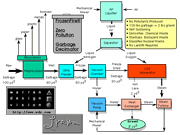
Ok, so imagine I give
you a basic mathematic operation, like addition.
For free I toss in a couple of integers and ask you
to add them together.
Without fumbling around you do so and give me back,
presto, another integer.
Life is good. Addition is closed with respect to the integers. Up the ante.
So I give you subtraction, and we play the
same game,
but no matter what integers I give you, you always
give me back a single integer.
Subtraction is closed with respect to the integers. Keep
going.
Multiplication is repeated addition.
I give you the multiply operator and a couple of integers
named a and b.
You multiple them and the result is always an integer.
For all time, for all locations, complete with your beaming personality.
Multiplication is closed with respect to the integers.
The answer is always a member
of the set from which the question was drawn.
The wind is at our back, all is well with the world.
Division is
repeated subtraction.
I give you the slash and all the integers
you can hold.
A slight blush develops as you wrestle with the problem.
If I give you
27 and a measuring rod called 5,
then you, completely rational as you are give me back 27over 5,
but you can't give me back a single integer,
unsullied by the division operator itself.
With extra effort you subtract 5 from 27 five times,
but then with two left over and you must report 5 and 2/5,
and that is not a single integer.
It is two or three but you can't get rid of the division sign.
So division doesn't seem quite as neat.
There is some litter and that litter hinders closure.
We could talk
more but,
I told you all that, to tell you something
else and that is this:
Imagine, if you will, a city named Mountainview,
built on a landfill, a sea of moist and compacted garbage, fermenting
as we speak. And on top of that mountain
with a view, imagine a castle called
Now imagine
a giant building that processes that garbage
mountain, to turn it back into a meadow. A
giant bulldozer delivers garbage to one side, and out of the other
side comes pure shrink wrapped cuboidal elements, ripped right off the periodic table, in
shrink wrap labeled, magnesium and calcium and zinc and silver
and copper and gold and nitrogen and oxygen and all those good
things that mother earth had in mind before we started talking
back.
What would it
take to take every piece of garbage and distill
it down to its elemental and purest form and place it on
a shelf marked clean? How many chemical reactions would be running
in that giant building and what is the one thing it would need
gobs and gobs of twenty-four, seven, three sixty five? What
would it take to run its Haber process,
its electrolytic separations, its fractionations, its pumps, its
chambers, its conveyor belts, its everything.
It would need
only energy and plenty of it, gobs and gobs of twenty-four,
seven, three sixty five, giant energy pumped through
giant shining copper tubes,
themselves the product of pristine reclamation.
A duty of religious order to avoid condemnation.
Where might
that energy come from, the wind, the sea, the sulfur springs, the
smile of you and me?
Or would we reach for yellow cake,
the cake we cannot eat,
the cake that frightens you and me,
that causes desolation.
When burned to glass like hockey pucks is stored until damnation?
It is the yellow cake I say,
the hexafluoride mist,
when spun in tubes by Sadam's men,
slips through the holes they missed.
We buy it on
spot market,
iron curtain falls with ease,
if we get our wallets out,
our children miss disease.
The yellow cake
if pinched and cracked we store in graphite rods.
Like my DARPA dream, with some we are at odds.
This fuel makes more, and
more what,
you ask about
the lie,
that planet
breeds plutonium, the most toxic in the sky.
But plutonium is not so toxic,
as Edward Teller
knows,
he just made
that up one day,
to keep us on
our toes.
So it is as,
as it is so much;
In the end what is worthless to one is precious to
another.
I simply wonder,
is there closure with respect to garbage?
- Van
